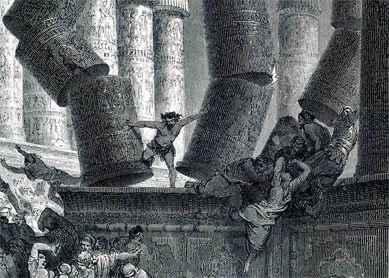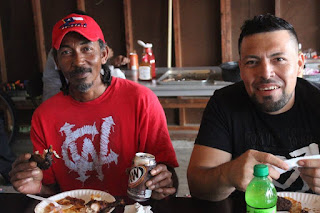“...but the Angel said to her
'...you will soon conceive and have a son!...for he shall be...a
special servant of God from the time of his birth; and he will begin
to rescue Israel...'” Judges
13:3-5, LB
30 “Don’t be frightened...” the angel told her, “for
God has decided to wonderfully bless you! 31 Very soon now,
you will become pregnant and have a baby boy...32 He shall be
very great and...And he shall reign over Israel forever...'” Luke
2:30-32, LB
My devotions this
year have come out of my meditative reading of the Book of Judges and
recently I was struck by the fact that of all the leaders named and
talked about in this volume, only Samson
has a story about
his birth. In fact, the Samson cycle is four chapters long (Judges
13-16 - pretty long as stories go in that book) and one quarter of it
alone (chapter 13) concerns how he came to be.
 |
| Samson as a baby boy? |
His parents, Manoah
and Mrs (only Delilah gets named in his story; all the other women –
including his mother – are simply referred to impersonally as in
“the woman”) live on the frontier of western Judah within
shouting distance of the hated Philistine hostiles that live in the
coastal region. Though they've been married for sometime they have no
children and to be barren in those days was a curse. And then one day
all that changes. Expectantly, while going about her housework, the
woman is met by an angel who shares with her remarkable news: she was
going to be a mother. In fact, she was already with child. Her only
son was destined for greatness (so the angel said) and therefore his
whole life he was to live the Nazirite way.
 |
| Did Samson have dreds? |
In those days, if
someone wanted to dedicate himself to God for a certain season of
time, he would inform the priest and this would be the terms of his
consecration: he was to drink nothing with alcohol in it, remain
ritually pure by steering clear of anything dead and refrain from
cutting his hair. It was the hair cut (or lack thereof) that would
give you away to be a Nazirite, a separated one. This kind of vow
could not be demanded. It was totally voluntary except in Samson's
case: the angel told the woman he was to be a Nazirite his entire
life, consecrated and set-apart for a special purpose. These were the
terms of his extraordinary life. In fact, later when the angel
returns and speaks to Manoah who wanted both confirmation as well as
further instructions all the angel will offer is what he commanded
the first time: he was to be a Nazirite for always. He would be God's
chosen tool to begin to deliver his people from the domination by the
Philistines.
 |
| The bad guys of Judges, Samuel and Kings |
Hundreds
of years before under Joshua's leadership, the Israelites had entered
the land and had begun the process of evicting the Canaanites. God's
instructions delivered by Moses had been very clear: everyone
must go. No one who did not embrace the leadership of Yahweh as it
was spelled out to Moses on Sinai was to remain in the land. If they
did in time, they would “turn your sons away from me to serve other
gods and the Lord's
anger will burn against you and quickly destroy you” (Deut 7:4).
Initially they had experienced impressive victories – Jericho, Ai,
Gibeon – but at the time of Joshua's retirement there were still
pockets of resistance of Canaanites who stubbornly remained in the
land of Promise. What the Book of Judges records is what happens to
God's people when they do not heed God's command: like a cancer the
attraction to the world – at least, the world of their Canaanite
neighbors – spreads insidiously among them and over a long period
of time they eventually become indistinguishable from them. By the
time Samson is born they've conformed so much to the worldly ways of
the Canaanites that they've nearly forgotten their unique identity as
a “people holy to the Lord
your God” (Deut 7:6). This stokes God's ire and if they will not
resist the Philistines and their growing cultural influence, he will.
Samson's life, so
the angel said, was the first salvo of deliverance from Philistine
domination. Later Saul would contend with them rigorously and David
would do clean-up. After King David's rule, the Philistines pretty
much vanish as a foil to God's people. But during Samson's lifetime
they are a prevalent menace that no Israelite will do anything about.
Unselfconsciously,
simply by being his impulsive, willful, selfish self, denying totally
the consecrated life he was destined to live, he becomes a wrecking
ball to Philistine hegemony. By the end of his short life, as the
Philistine body count mounts he literally pulls the house down on top
of their leaders, their priests and their god (see Judges 16). But
even as the dust settles I can't get around the fact that his life
was pretty much a train wreck that leaves me wondering what could
have been had he tried to live the set-apart life he was called to
live.
In my
previous readings of Samson I've read the end of his story as almost
like a “thief-on-the-cross” moment – a guy who realizes too
late that he's squandered the gift God had given him but now requests
one more opportunity to glorify God before his life is over. But
that's not what the narrator tells us. Yes, his hair begins to grow
again (16:22) (did none of the guys who captured him tell their boss
what Delilah had learned about his hair?) Was nobody paying attention
when following his “performance” (could it have been feats of
strength?) he asked to be put between the pillars that “hold the
temple up”? (v. 27) But the nature of his final prayer reveals the
soul of the man. Here was no penitent thief on the cross- kind of
prayer, i.e., “Lord, remember me when you enter your
kingdom” but “Oh,
please, give strength yet once more. God! With one avenging blow let
me be avenged on the Philistines for my two eyes!” (v. 28). No
contrition here. There is nothing but a desire for revenge and with
one mighty shove he dies with those he had lived and contended with
for much of his life.
Reading his story again during Advent I
couldn't help but hear echos of the Nativity story that we read again
at this time of year:
- Like Jesus, the angel announced to his mother who was barren that she would give birth to a son.
- Like Jesus, the angel shared with her knowledge that he was being consecrated for a special purpose.
- Like Jesus, Samson was born to two parents living on the outskirts of wherever the action was (e.g., he was not born in Shiloh where the Tabernacle resided).
- Like Jesus, he was rejected by his own people and turned over to Gentile overlords (Judges 15).
- And like Jesus, his delivering-work that he was born to do was consummated in his death.
But for all that Samson was nothing
like Jesus. As one man puts it aptly:
He
is one of the most narcissistic persons in all the Bible.
Self-gratification is what drives this man. Never in the Samson
narrative does he operate in anyone's interest but his own. He does
not care about God's plan or any of the divine standards of either
his place as an Israelite or his Nazirite status. He does not care
about the will of his parents or the hearts of his “lovers” with
whom he consorts. All are to be manipulated for his sake...Very
simply, Samson is not a type of Christ...Instead, if anything,
Samson is a foil to Christ. Yes, there are similarities, but the
contrasts are much greater. The similarities only heighten the
contrasts all the more.
(NIV Application Commentary on Judges by K.
Lawson Younger, Jr pp. 327-28)
How
vastly different is the Savior that we welcome at his birth every
December 25.
"He had equal status with God
but didn’t think so much of himself that he had to cling to the
advantages of that status no matter what. Not at all. When the time
came, he set aside the privileges of deity and took on the status of
a slave, became human! Having become human, he stayed
human. It was an incredibly humbling process. He didn’t claim
special privileges. Instead, he lived a selfless, obedient life and
then died a selfless, obedient death—and the worst kind of death
at that—a crucifixion." Philippians
2:5-8, Msg
“God made him who had no sin to
be sin for us, so that in him we might become the righteousness of
God.” 2 Corinthians 5:21, NIV
At the
credits roll on Samson's story the narrator adds, “He had led
 |
| This is how I usually imagine Samson |
 |
| But what if he looked more like Mark Ruffalo than Dwayne Johnson? |
Regardless,
his legacy is tragic. Sure, he killed a lot of Philistines before his
death but he frittered away his life and the awesome God-given
potential that he had been born with. It provokes me to not
be like him. To not
live only for myself and my own version of success as we define it
around here. To live, rather, obediently and faithfully and aspire to
follow the path that Christ himself took all the way to Golgotha, if
that is what is required of me.































